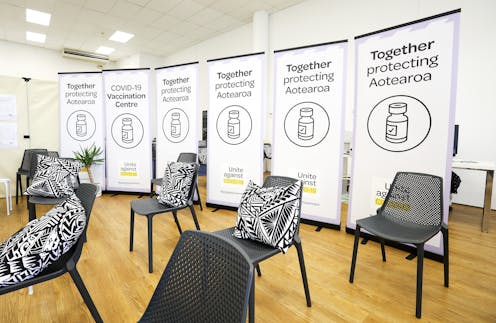New Zealand's second-largest city faces weeks of delays in the COVID-19 vaccine rollout
- Written by Bernard Walker, Associate Professor in Organisations and Leadership, University of Canterbury

A crucial delivery[1] of 150,000 doses of the Pfizer vaccine has arrived in New Zealand this week, ahead of schedule.
But at the same time, the vaccination of most people living in the Canterbury region has been moved back[2] by at least two months.
For the rest of the country, people in group 4 of the vaccination programme will become eligible by the end of July. But those living in Christchurch – New Zealand’s second-largest city – and the Canterbury region will only get their first vaccine dose from mid-September, at the earliest. The region’s COVID-19 response officer Ralph La Salle encouraged everyone “to be patient[3]”.
It appears one of the reasons for the delays is that the vulnerable group 3 residents in the region are already facing delays, with only 2% vaccinated. While people in group 4 across the country will largely follow the government’s scheduled timeline, the Canterbury region will be left waiting to catch up.
Such regional disparities in the vaccine programme are unacceptable as borders reopen and quarantine-free travel with three Australian states resumes this week.
Being “patient” is the polar opposite of what we need for an effective COVID-19 response. We are still in the middle of a worldwide pandemic, and our nearest neighbour Australia has millions of people enduring lockdowns resulting from border failures.
New Zealand was lucky to avoid the same scenario following a weekend visit by an Australian traveller[4] who subsequently tested positive for the Delta variant.
Read more: New Zealand has managed to dodge the COVID-19 bullet, again. Here's why[5]
Further border failures[6] are highly probable. Compared to Australia’s border control, New Zealand’s system has been estimated to be up to three times more likely[7] to be breached.
A failure to vaccinate raises the risk of expensive lockdowns. From a business perspective, this year’s level 3 lockdown in Auckland cost the country around NZ$240 million per week[8]. Leaving Christchurch unvaccinated for an extended period in this current situation represents a significant threat to the overall economy.
Heightened urgency for vaccination
Vaccination is now a time-critical activity. The Delta variant is up to twice as infectious[9] as the original strain and can cause more severe symptoms, with increased rates of hospitalisation[10] and deaths.
The number of people suffering from “long COVID” is also rising. Studies show 37%-61% of people experience ongoing symptoms[11] for months after infection, affecting their ability to work and study[12].
Leading scientists and health experts[13] are urgently calling for an acceleration of New Zealand’s vaccine rollout, given the heightened risks from new variants and the gradual opening of travel across the country’s borders.
New Zealand residents have already been extremely patient. They have waited, knowing that two thirds of the UK adult population are now fully vaccinated[14], with US numbers close behind. In contrast, New Zealand sits at 9%[15], one of the lowest in the OECD[16].
For the Canterbury District Health Board to delay vaccination even further would appear to be a breach of trust, and a significant failure in caring for its people.
The delays present risks and potentially adverse consequences, not only for the Canterbury region but for New Zealand. The combined economic, health and social costs all highlight the need for all vaccination programmes to get into action immediately, as vaccine stocks become available, and follow central government’s proposed timeline, with a July 28 start.
Vaccination is a government responsibility
There are no indications of a valid reason that would justify a delay for a region such as Canterbury. Although nationwide vaccine supplies have been limited, we are told the latest delivery should supply the intended nationwide rollout.
The benchmark for comparisons is the performance of district health boards in other regions. Many of those with a similar resource base of vaccines and staff are working to the government’s schedule[17] or even exceeding it.
Read more: At least four in five New Zealanders will have to be vaccinated before border controls can be fully relaxed[18]
The government has overall responsibility for ensuring the vaccination programme proceeds promptly across the country. If the Canterbury District Health Board cannot meet its obligations, then the health minister needs to intervene. A pandemic is not a time for re-living any longstanding feuds[19] between regional health boards and the central ministry of health.
If the problems stem from barriers in the management of the local response, those processes must be remedied. If there is a shortage of funding or other resources, central resources should be made available, urgently. The costs of those interventions would be small compared to the effect of outbreaks on the wider economy and the health of the population.
“Patience” is a euphemism for tolerating delays, but unwarranted regional delays are not something we should accept when confronting COVID-19.
References
- ^ crucial delivery (www.nzherald.co.nz)
- ^ moved back (www.stuff.co.nz)
- ^ to be patient (www.stuff.co.nz)
- ^ weekend visit by an Australian traveller (www.rnz.co.nz)
- ^ New Zealand has managed to dodge the COVID-19 bullet, again. Here's why (theconversation.com)
- ^ border failures (theconversation.com)
- ^ three times more likely (www.medrxiv.org)
- ^ NZ$240 million per week (www.stuff.co.nz)
- ^ twice as infectious (www.rnz.co.nz)
- ^ hospitalisation (assets.publishing.service.gov.uk)
- ^ ongoing symptoms (www.imperial.ac.uk)
- ^ work and study (www.nature.com)
- ^ health experts (blogs.otago.ac.nz)
- ^ fully vaccinated (coronavirus.data.gov.uk)
- ^ sits at 9% (ourworldindata.org)
- ^ lowest in the OECD (www.tvnz.co.nz)
- ^ working to the government’s schedule (www.health.govt.nz)
- ^ At least four in five New Zealanders will have to be vaccinated before border controls can be fully relaxed (theconversation.com)
- ^ longstanding feuds (otaihangasecondopinion.wordpress.com)

















